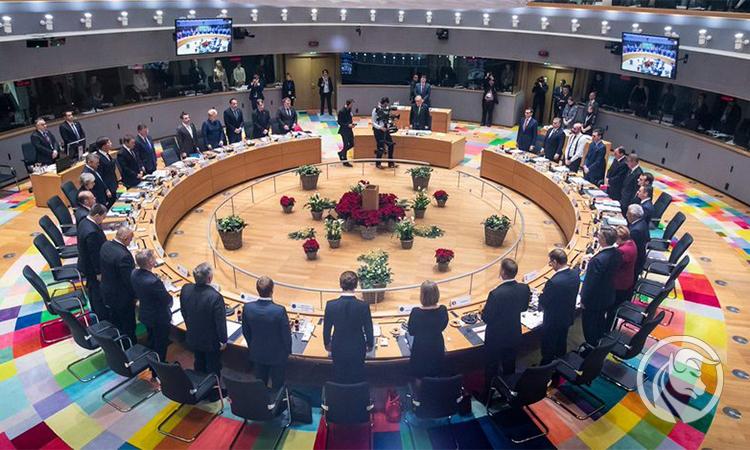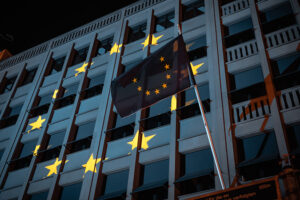Before the European Council meeting: Car or carriage
The agenda for the Thursday meeting of the European Council consists essentially of four items: 1) a package worth EUR 540 billion, agreed by the Eurogroup on April 9, including an EMS soft line under "soft" conditions, support loans to reduce the risk of unemployment due to emergency situation (SURE) and from the European Investment Bank, 2) draft resolution fund, 3) draft multiannual financial framework (MFF) for 2021-2027 and 4) discussion on the European action plan leading to the abolition of measures to contain the spread of COVID-19.
About the Author
 Christopher Dembik - French economist of Polish origin. Is a global head of macroeconomic research at a Danish investment bank Saxo Bank (a subsidiary of the Chinese company Geely serving 860 HNW customers around the world). He is also an advisor to French parliamentarians and a member of the Polish think tank CASE, which took first place in the economic think tank in Central and Eastern Europe according to the report of the Global Go To Think Tank Index. As a global head of macroeconomic research, he supports branches, providing analysis of global monetary policy and macroeconomic developments to institutional and HNW clients in Europe and MENA. He is a regular commentator in international media (CNBC, Reuters, FT, BFM TV, France 000, etc.) and a speaker at international events (COP2, MENA Investment Congress, Paris Global Conference, etc.).
Christopher Dembik - French economist of Polish origin. Is a global head of macroeconomic research at a Danish investment bank Saxo Bank (a subsidiary of the Chinese company Geely serving 860 HNW customers around the world). He is also an advisor to French parliamentarians and a member of the Polish think tank CASE, which took first place in the economic think tank in Central and Eastern Europe according to the report of the Global Go To Think Tank Index. As a global head of macroeconomic research, he supports branches, providing analysis of global monetary policy and macroeconomic developments to institutional and HNW clients in Europe and MENA. He is a regular commentator in international media (CNBC, Reuters, FT, BFM TV, France 000, etc.) and a speaker at international events (COP2, MENA Investment Congress, Paris Global Conference, etc.).
Eurogroup rescue package
The main contentious issue discussed by finance ministers will most likely be the credit line under the European Stability Mechanism. The Eurogroup agreed to soft terms, arguing that the credit line will only be used to cover the 'direct and indirect' costs of healthcare associated with COVID-19, while in normal circumstances, countries requesting ESM support must sign a memorandum of understanding detailing the necessary reforms structural, which undertake to carry out. Despite the more favorable conditions, Italian Prime Minister Conte immediately rejected the idea of launching the EMS after Eurogroup announcements.
In order to reach agreement and obtain the consent of Italy and other countries, support under the EMS should be more attractive than standard programs under the EMS, i.e. it should:
- Enable countries to raise loans exceeding 2% of GDP or EUR 240 billion.
- Extend the maturity of an EMS loan beyond 12 years and a grace period of more than 5 years.
- Lower the spread relative to the EMS funding rate to cover EMS costs near zero (compared to 10 basis points under standard programs).
The resolution fund project
The Eurogroup mentioned the need to discuss 'innovative financial instruments' for the purposes of the resolution fund, without directly addressing the issue of debt mutalization or a crown of bonds. This vague reference, formulated so as not to offend any of the countries, is a perfect example of a policy of imprecision. As a result, each Member State heard what they wanted to hear. The Netherlands has understood that there will be no debt mutualisation, while it has become clear to Italy, Spain and France that the way has been opened to a serious debate on a crown bond. Over the past two weeks, the latter group of countries has been actively campaigning for the crown of bonds, illustrated by the following quotes from President Macron and Prime Minister Costa:
Last week's statement by French President Emmanuel Macron to the Financial Times: "A moment of truth awaits us, it is a decision whether the EU is a political project or only a market project. In my opinion, this is a political project (...) We need financial transfers and solidarity, if only to make Europe survive. "
Statement by Portuguese Prime Minister Antonio Costa on April 11:
"We need to know if we can continue the cooperation of the 27 EU member states, 19 (countries in the euro area), or whether someone wants to be excluded from it. Of course, I'm talking about the Netherlands. "
Before the European Council meeting, tensions related to this topic are likely to increase even more, given the recent attention of German Chancellor Angela Merkel at the CDU meeting suggesting that crown bonds are the wrong direction.
The simplest part: legal and institutional framework
The legal basis for burden sharing is Article 122 of the Treaty on the Functioning of the European Union, stating that:
"Where a Member State has difficulties or is seriously threatened by serious difficulties due to natural disasters or exceptional circumstances beyond its control, the Council, on a proposal from the Commission, may grant Union Member State financial assistance under certain conditions. The President of the Council shall inform the European Parliament of the decision taken. "
Ideally, for the purposes of simplification, the resolution fund should be institutionally integrated into the existing EU financial architecture and at least partly funded from the EU budget.
The hardest part: how to finance it?
The next question is the source of financing for the resolution fund. Proponents of a koruna must clarify what they mean by the term 'koruna', what amount they want to get, how the revenue should be allocated and why the koruna is better than issuing debt at national level, which is then bought back by the ECB.
Spain has already given the initial answer. The Spanish government published a working document - a relatively frequent phenomenon before key European Council meetings - describing in detail the functioning of the resolution fund. It calls for debt worth up to EUR 1,5 trillion over the next two to three years, financed by indefinite debt and paid to Member States in the form of grants - not debt (thus avoiding significant debt) - through the EU budget. France has already mentioned the link between the resolution fund and the EU budget, and this is an idea that Germany could hypothetically accept because it does not involve legal changes. The repayment would be financed from own resources, such as a cross-border carbon tax. Member States that previously supported the idea of a crown bond could support this project, which is currently the most detailed.
However, agreement is still very far away. Because European Central Bank literally cleans the secondary market as part of the Pandemic Emergency Purchasing Program, the risk of debt crisis is almost zero, which significantly reduces the incentive to reach an agreement. The most likely outcome of the Thursday meeting will be that the European Council gives the Eurogroup a broader and more general mandate to examine the possibilities of establishing and financing a resolution fund for the post-pandemic period, without explicit reference to the crown.
WRF project for the next six years
The talks should also take into account the draft MFF 2021-2027 in the context of the crisis. For now, we have not obtained information on the positions of individual Member States. Also in this case, the Spanish working document contains interesting demands, in particular regarding the introduction of the function of real stabilization in the euro area through reinsurance of unemployment (which will certainly meet strong resistance from the Netherlands and other countries belonging to the "economical four") and the stabilization of investment. The talks on the MFF are likely to last for many weeks.
European action plan leading to the abolition of measures to contain the spread of COVID-19
The European Commission is expected to present further details "European Action Plan to lift measures to prevent the spread of COVID-19", published a few days ago. The fifteen-page document does not actually propose real coordination at European level. In principle, the only reference to any coordination is: "Member States should at least inform each other and the Commission in advance through the Health Security Committee in advance of announcing the lifting of measures, and take into account the opinions expressed." This is de facto wishful thinking, because several Member States have already started implementing the strategy of opening the country without notifying the European Commission.
source: Christopher Dembik, director of macroeconomic analysis in Saxo Bank






















![Forex Club – Tax 9 – Settle tax on a foreign broker [Download the Application] Forex Club - Tax 9](https://forexclub.pl/wp-content/uploads/2024/02/Forex-Club-Podatek-9-184x120.jpg?v=1709046278)
![Trading View platform – solutions tailored to the needs of traders [Review] trading view review](https://forexclub.pl/wp-content/uploads/2024/03/trading-view-recenzja-184x120.jpg?v=1709558918)
![How to connect your FP Markets account to the Trading View platform [Guide] fp markets trading view](https://forexclub.pl/wp-content/uploads/2024/02/fp-markets-trading-view-184x120.jpg?v=1708677291)
![How to invest in ChatGPT and AI? Stocks and ETFs [Guide] how to invest in chatgpt and artificial intelligence](https://forexclub.pl/wp-content/uploads/2023/02/jak-inwestowac-w-chatgpt-i-sztuczna-inteligencje-184x120.jpg?v=1676364263)




![Izabela Górecka – “Success on the market depends not only on knowledge, but also on emotional stability” [Interview] Izabela Górecka - interview](https://forexclub.pl/wp-content/uploads/2024/04/Izabela-Gorecka-wywiad-184x120.jpg?v=1713870578)
![WeWork – the anatomy of the collapse of a company valued at $47 billion [WeWork, part II] wework bankruptcy story](https://forexclub.pl/wp-content/uploads/2024/04/wework-bankructwo-historia-184x120.jpg?v=1711729561)
![Adam Neumann – the man who screwed up Softbank [WeWork, part AND] adam neumann wework](https://forexclub.pl/wp-content/uploads/2024/04/adam-neumann-wework-184x120.jpg?v=1711728724)




![The most common mistakes of a beginner trader - Mr Yogi [VIDEO] Scalping - The most common mistakes of a beginner trader - VIDEO](https://forexclub.pl/wp-content/uploads/2024/03/Scalping-Najczestsze-bledy-poczatkujacego-tradera-VIDEO-184x120.jpg?v=1711601376)
![Learning patience: No position is also a position - Mr Yogi [VIDEO] Scalping - Learning patience - No position is also a position - VIDEO](https://forexclub.pl/wp-content/uploads/2024/03/Scalping-Nauka-cierpliwosci-Brak-pozycji-to-tez-pozycja-VIDEO-184x120.jpg?v=1710999249)
![When to exit a position and how to minimize losses - Mr Yogi [VIDEO] Scalping - When to exit a position and how to minimize losses - VIDEO](https://forexclub.pl/wp-content/uploads/2024/03/Scalping-Kiedy-wyjsc-z-pozycji-i-jak-minimalizowac-straty-VIDEO-184x120.jpg?v=1710336731)


















Stupid virus, and the crisis will be as great as never before.